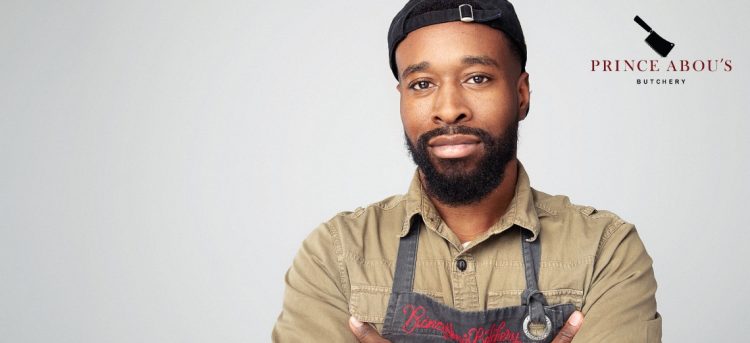Abou Sow started Prince Abou’s Butchery to ensure that the people of New York are rescued from eating meat that isn’t fresh. “It’s a tragedy that New Yorkers (as well as people all across the country) don’t have access to fresh meat and are instead eating meat that was slaughtered months ago,” he says. “That’s why we work with local farmers, slaughter, butcher, and deliver halal meat to New Yorkers all within the same week.”
This unique business model helps them offer the freshest meat to their customers and makes the transaction of buying meat completely transparent. “Our customers know where the meat is coming from, who is doing the butchering, and where it’s being butchered,” says Abou.
A Royal Name and $37.00
With $37.00 he’d saved from working a part-time job, he started on his mission to provide fresh meat to his customers “…one lambchop at a time.” A princely goal—but a goal he’s uniquely qualified to tackle.
Abou’s father is the paramount chief of their home village in Senegal, West Africa; making him Prince Abou. “When it came time to choose a name for my business, it just made sense to name it after myself,” he said.
Insulated from the Pandemic
In March, as a result of the pandemic, the industrial food industry broke down, specifically when it came to meat. Prince Abou’s unique business model insulated his business from the trauma related to that because they don’t participate in that system. “There is a strong chance New York will enter into a second shut down,” he said. “If it does, we will do our very best to keep our community fed once again.”
Fueling Expansion with the Nav Grant
Abou will use the $10,000 grant proceeds to build out larger inventory space, join local farmer’s markets and hire additional staff to help with the anticipated increase in volume. Abou says, “This expansion will help us better serve the greater NYC area and reach customers that haven’t had the chance to try our products.
One of the more difficult things about his business is getting farmers on board with the business model. “We live in the Internet and social media age,” he says. “Many farmers simply aren’t online, so finding those that could work with us can be a challenge. When we finally do though, they are usually excited and willing to work with us.”
The other challenge Prince Abou faces is keeping up with customer demand, but he expects the Nav Grant to help with that.
Was There Ever a Time When You Thought You Might Give Up?
“Just about every day,” he says laughing. “But what we’re doing is meaningful and it’s not in my nature to give up.”
“We are providing a healthier meat option for our community during a time when healthy food is extremely important,” he says. “Customers want a more direct line to the food they consume, with less steps involved, meaning there is less chance for contamination along with a healthier dietary choice. This is exactly what our business model provides.”
When we asked him if he had any advice for others contemplating starting a business his advice was to:
- Start now. Start today.
- Don’t start with the attorneys, just start your business and find out if anyone is interested in your product first.
- If it does well, decide what business entity makes sense, etc.
He also talked about his relationship with Mr. Roy Pellicano from the Queens Economic Development Center (QEDC) and what a powerful mentor he has been. “He is an absolute genius when it comes to business and has helped me grow my business in a very short time,” he says. “He is tried and true.”
Whether it’s the QEDC, a local SBDC where you are, or SCORE, there are a lot of resources available to help small business owners build a strong and successful small business. It’s not a surprise that he found someone at the QEDC to help him.
Nav and the Nav Grant
Abou hadn’t heard about Nav until he started searching online for a business grant, but now that he has he’s excited to dive into all of the small business resources available there.
Nav offers both a $10,000 and a $5,000 grant every quarter to small businesses all across the country. Your business can also apply for a Nav grant.
What’s Next For Prince Abou’s Butchery?
Learning how to successfully run a business in the middle of a global pandemic is at the top of his list. It presents a lot of additional challenges and is still new, but “We want to not only survive, but thrive during these challenging times,” he says. “And, I think we can.”
This article was originally written on January 21, 2021.

What are the steps to obtain the $10.000 PPP Loan??
I think you may be confusing PPP and EIDL. The EIDL grant is $10,000. You can read about it here. The forgivable PPP loan amount depends on your payroll. You can learn about it here.
Best of luck to Abu and his success. I hope you make the best of this opportunity. As an African immigrant and a business woman I know the struggles, that’s I’m always excited to hear inspiration stories like Abu’s
Great story. I’m most excited about the farm to table business model. The way of mass production has taken over our food industry and the model that they follow is unethical. Prince Abou’s Butchery model seems to be ethical. For consumers as myself that is important when I’m making my purchases because it takes out the guessing games about the process that my meat had to go through before being shelved .
Great story. I am proud of Prince Abou.